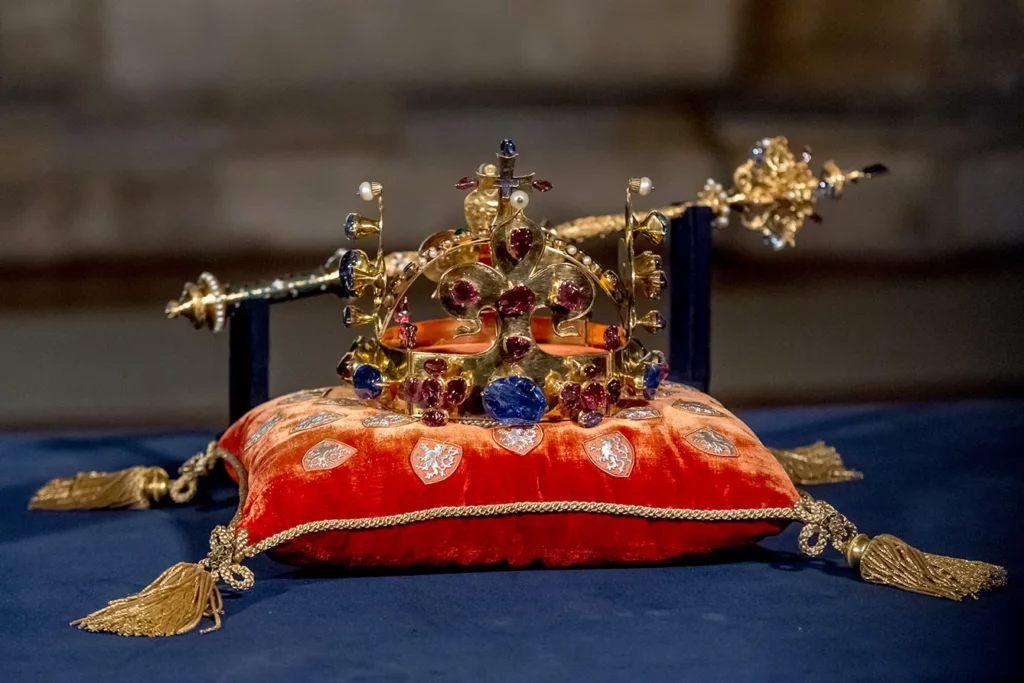Charles University, Charles Bridge, and Karlstejn – famous Czech landmarks that all bear the name of their founder, the most prominent European ruler of the late Middle Ages. Charles IV was the eleventh King of Bohemia, King of Germany, King of Italy, and from 1355 Emperor of the Holy Roman Empire. His reign was, therefore, unique: he became the personal ruler of all the kingdoms of the Holy Roman Empire.
The thorny road to the throne
Charles’s childhood was very complicated. He was born in 1316 in Prague as Václav. His mother, Eliška Přemyslovna, was a princess of a prominent Czech noble family that had ruled Bohemia since the founding of the Czech state. But no royal life awaited Václav: he spent the first six years of his life interned at several castles across the country, separated from both of his parents. At age seven, his father, John of Luxembourg, sent him to France, fearing Eliška could plot against him, using Václav as leverage. In France, Václav became a knight at the court of his uncle, Charles IV., King of France. And it was in France where Václav took his uncle’s name: Charles.
Charles never saw his mother again but gained a prestigious education from the best European scholars. Over the years, young Charles proved to be a highly intelligent and skilled military leader. He participated in three successful crusades to Lithuania, successfully besieged Cracow, and fought against his father’s enemies in Northern Italy.
A harrowing return and climb to power
When Karel returned to the Czech lands at age 17, he had to learn Czech again, which he had forgotten during his long years abroad. His father, the King of Bohemia, called him back to his homeland to help him tame the rebellious Czechs and stabilize the internal political situation. Charles’ mere presence calmed the situation. It is said that one of the rebellious nobles when he first met Charles, cried out in front of everyone: “Behold, here is my king! The heir of Přemyslids, the son of his mother, and the savior of the kingdom.” Charles became governor of Bohemia and Moravia during his father’s lifetime and secured the crown of German lands, becoming the King of Germany.

After his father’s death, he was immediately crowned King of Bohemia at 31. It took 24 years for Charles to become a King of the country he was born in, the country his ancestors ruled since the beginning of the Czech Statehood. His successful diplomacy also secured him Lombardian and Burgundian crowns soon after, making him the King of Italy. The final step was securing the crown of the Holy Roman Empire. That took Charles only nine years, and he was finally crowned as Roman Emperor in 1355. He became the most powerful monarch of his time.
Charles the Builder
At the time of Charles’ coronation as Czech King, the Czech lands were devastated, and Prague Castle was uninhabitable. The first tasks were clear: repair Prague Castle and stabilize the economy. It was as if there was no project that Charles couldn’t do – everything he touched turned to gold.
He designed and began the expansion of Prague by building a whole new part: The New Town of Prague. This move only consolidated Prague’s title of one of the biggest cities of the Middle Ages. He started the construction of St. Vitus Cathedral, the pride of Prague Castle, and built the first stone bridge over the Vltava River: Charles Bridge.
He aimed to spread education in the Czech lands. Having the best education himself (he read, wrote, and spoke five languages), he wanted his people to achieve some degree of education as well. His love of knowledge materialized in founding the first university north of the Alps, which still bears his name: Charles University.
His legacy can also be found in medicine. One day, while traveling through West Bohemia, he washed his injured leg with a mineral spring that came to the surface in one village. His leg healed, and Charles IV. ordered a royal town to be built on the spot: the city of Karlovy Vary.
Father of the Country is what Charles IV is still called in Czechia. And for a good reason. He is considered one of the most important Czechs in history, who managed to unite most of Europe at that time through diplomacy and wisdom. His legacy lives on forever in the Czech Republic and still inspires many today.







